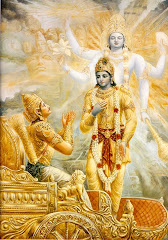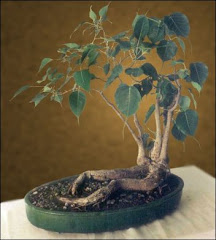Does art imitate life? Or the other way around? Or do they
reinforce each other as in resonance?
This has been a much-discussed topic. I say: it is the "reel"
that impacts the "real".
This is because: the visual medium is very strong. We may read something or hear something. But
when the same disgusting, regressive and negative aspects are projected on the
big and small screens relentlessly and then glorified (however subtly) - it
makes a huge impact. When such things become a trend, they become the
harbingers of... and bring about (negative and regressive) cultural changes:
changes in perception, thinking and behaviour; which in turn results in the glorification of machismo and a forcibly advocated subdued position of
women. [Though our big-and-small-screen-worthies have been happily propagating
such negative stuff under the garb of 'our ancient culture and tradition'.]
Glorification of violent and regressive behaviour on the big screen, especially by big
heroes (who act as the reference point or idols for a large chunk of the
population) - gives it social acceptance. This is indisputable.
Remember: It has always been far easier to bring about
negative change than positive ones... since the former creates formidable
vested interests.
Therefore, when filmmakers quip that films have
also been talking about peace, amity and communal harmony... but that doesn't
mean that communal discord has been wiped off India - they are simply
trying to skirt and/or deflect the issue, by deftly defending the role played by the
big screen - in bringing things to such a pass.
'Coz: It is much easier to think and
behave in a negative or regressive manner with the female of the species than to bring about
peace in society. And it is much easier to resort to crude language and lewd
gestures, or to indulge in domestic violence et al than to bring about communal harmony. [However, if the regressive, misogynist and
negative values (as propounded by the big and small screens) were to be curbed,
or at least were to be largely curtailed, it will undoubtedly contribute towards peace in society
and in our lives - but this will take years rather generations to happen, provided there is an all-round sustained effort in that direction. Changing negative mindset/perception is not easy. There is no switch that can be turned-off.]
One must also examine the films depicting peace,
amity and communal harmony, viz:
1. How many such films are there? And how many of them depict these noble virtues in a
pristine manner?
2. What percentage of each of these films are dedicated to these
noble aspects, and what chunk of the same films are occupied by "other
narrative", including jingoistic and violent behaviour; regressive values, gestures and dialogues -
especially with respect to women; misogynist jokes; crude demeanor of the hero
(the male lead/star/super-star/mega-star); depiction of women as objects of titillation -
including raunchy 'item numbers' and 'songs' with crude and suggestive lyrics...
and the like.]
Trust me, once we take a closer look at our films, including the ones supposedly propagating noble virtues, doodh ka doodh aur paani ka paani ho
jayega. :)
[The role of the small-screen too should not be
ignored. Their reach and impact is equally powerful - and has been utilized to
the hilt.]
Granted,
that one or two films will not make much of a difference. However, if such
regressive films depicting women in a derogatory manner become a trend, they
bring about a (negative) change in perception and alter mindset - without much ado.
For
example: If big heroes are shown slapping or demeaning women, such behaviour
gets the seal of social acceptance. If dialogues like, 'only a husband has the
right to beat his wife' gets woven into the narrative, and is then mouthed by big
heroes, they make a powerful impact - albeit a negative one. Ditto - if big heroes/stars glorify machismo as something that is naturally ordained, and propagate the subjugation of women as
part of 'our ancient culture and tradition'.
Once
these toxic aspects are injected into society, they result in negative
mindset and negative perception. These in turn bring about regressive cultural changes that also include violent behaviour towards women. Rolling back such poisonous
aspects is a Herculean task; it will take hundreds of years + sustained efforts
throughout. Are we up for it?
The big
and small screens have a huge impact on the society and on our lives - whether we
acknowledge this or not. They are the major vehicles or channels for creating
mindset and perceptions; and have been used to the hilt.
The last
four decades have been particularly nasty, and has had a very negative impact
on society; despite huge hits having been delivered, mass heroes garlanded, and umpteen jubilees celebrated.
Prior to that, negativities have been injected in small doses (possibly as a "warm
up" exercise). E.g. a harmless looking old man (usually playing the role of a respectable family elder or a learned school master) sagely blames
women - for all disputes or unhappiness within a family and/or society. Or
stresses on how 'in their times' women did this or that - and thereby 'upheld our ancient customs and traditions'. There were references to the 'western clothes'
(jeans, trousers) worn by loose/immoral women - the ones that did not 'uphold
our ancient customs and traditions' - by wearing those 'western clothes'. However, nothing has ever been said about
the jeans and trousers worn by the men-folk on screen and all over the country.
Umm, were/are these not 'western clothes' then? :)
The tone and tenor of the dialogues, the slant of the scripts, the demeanour of the heroes et al has been very different in the last four decades. Contrast this to say Shammi Kapoor in his heydays. You notice the difference, don't you?
The tone and tenor of the dialogues, the slant of the scripts, the demeanour of the heroes et al has been very different in the last four decades. Contrast this to say Shammi Kapoor in his heydays. You notice the difference, don't you?
Also: if we are
to rewind a few years (rather: decades) and trace the etymology of the
obnoxious behaviour displayed by a certain section of society (like ricksha-wallas, bus drivers, mechanics et al) - towards women and their other passengers,
we can trace them all to the impact of the big screen. More specifically, to the
on-screen shenanigans of much-garlanded "mass heroes" and their glorification
of such behaviour (via their on-screen demeanor and crude dialogues.)
This section of
society (ricksha-wallas, bus drivers, mechanics, and the like) take pride in watching "first-day first-show", love to display posters and stickers of
their favourite heroes, and try to imitate their matinee idols' on-screen style and behaviour. Sadly,
this trend has not only endured but continues to this day via regional films and serials. [Yes, the
small screen does play its part. Diligently.]
Women
coming out of homes will not make much of a difference; so long there is no
negative and/or disgusting perception(s) about them.
Misogynist jokes and dialogues, "item numbers", regressive advertisements et al are just part of this whole game of
creating negative mindsets. Do scrutinize the regressive dialogues, crude and
misogynist jokes and clichés; so-called comedy and laughter shows (once again filled
with clichés + misogynist jokes), and the negative body language of big heroes and comedy show participants. The
message sent out is relentless, besides being extremely potent.
And all of these
- things/aspects/behaviour - catch on very fast and very easily. Undoing them is a
Herculean task though.
Incidentally: many people try to point towards the restrictive
societies and then innocently ask (in an effort to absolve the big
screen no doubt) - as to how come rape and violence against women are rampant within restrictive societies as well.
The answer is: these restrictive societies (where
rape and violence against women is rampant) have always been not only restrictive, but violent too.
These societies have essentially been savage societies; though members of these societies may have now gained greater
influence through certain means, their ancestors have always been barbaric people
that mistreated their women, buried them alive, coveted other people's
spouses and forcibly took them away. These societies have always treated women
as dirt; as nothing more than child-bearing machines. So the cultural influence has always
been there, and hence, such regressive perception and disgusting behaviour vis-à-vis women is de rigueur.
As for
'item numbers' (including suggestive body language and gyrations), the heroine
or the female swaying to such 'songs' is of course partly responsible - for their impact. However, the
ones that insist on incorporating such repulsive stuff should shoulder the
lion's share of the responsibility; the onus lies on them, since they are the
ones that supply the Vitamin M.
Plus: 'item girls' - unless they are big names/heroines,
are NOT role models. Neither are the villains.
Hence: the major impact-makers
are the big heroes; the big male leads/stars/super-stars/mega-stars/the matinee-idols/the screen gods. 'Coz, they are the role models/idols for a large chunk of the population and
so, their on-screen shenanigans (dubbed and celebrated as herogiri) are the reference
points - for their legions of worshiping fans.
Regressive aspects, negative values and violence - once glamorized by these
big heroes/stars - automatically give all of it the cloak of respectability... and thence, instant social
acceptance.
However, the focus should also be on the ones supplying
the Vitamin M, besides on the ones penning such sad dialogues and lyrics, as
well as on the ones directing such drivel.
"Patriarchy"
per se is not to be blamed, since it does not have a life of its own. It
is the caliber and quality of men that has fallen sharply.
Relationships
and intimacy has been so degraded that retrieving it is practically impossible.
What kind of words and phrases has become part of our psyche and our vocabulary?
How do we think and/or view certain events, or rather have become accustomed to thinking and viewing them?
Rape and
violence has been injected in such a manner, and in such large doses, that we
have been completely de-sensitized. We do not even blink: when daughters and sisters
are raped by their fathers/uncles/brothers! Strangely: either the 'debate' is firmly
steered towards the "victims' clothing" or is centred on the "victim having
ventured out at night"... and hence having "asked for it"...! Always.
Surely, a
sister or a daughter never "asks for it" from her father, uncle or brother,
right?
And a baby, a toddler, a little girl or the elderly too does not "ask
for it" - from anyone. Is it not?
Rape is a
heinous crime. Yet the perception has been successfully created that it is the
victim that is somehow to be blamed. So: the rapists' faces are covered to
'protect their identity' while the victim is ostracized. Else: a debate
is initiated about the feasibility of punishment or the rapist being a "juvenile".
Someone capable of committing such a horrendous crime is a "juvenile",
how odd is that?
We come across lots of instances of guys fighting over
girls in colleges and localities. And this violent behaviour and
regressive mentality (of viewing girls as objects) can be traced to the deluge
of movies that have gloried violence and such negative behaviour.
It is not
about venturing out at night, since these incidents are happening at all times -
24/7. It is not about clothes either: since babies, toddlers, little
girls and senior citizens are being regularly molested and raped, even by their close relatives.
It is not
about alcohol too, since no drunken man has ever lain in the middle of the
road. So they clearly retain their senses and faculties sufficiently enough, don't you
think?
It is not
about subjugation of women or women's empowerment per se.
It is about what is being done under this garb. If a woman
sheds clothes, mouths strange dialogues, does suggestive dance numbers, or 'acts' in nothing-left-to-the-imagination
bedroom scenes - all of it is hailed and labeled as "liberated", "bold", "daring", "glamorous",
"empowered" and so on.
So you see?
So you see?
It is a
double-edged sword; the impact - both ways - is detrimental for women in
general... and society - in particular. [In light of what has been done to words/phrases/perceptions/gestures like: "bold", "daring",
"liberated", and the like... families will not even think of providing the necessary wherewithal
to their daughters - so that they can become truly "empowered" or "liberated". And
what do you think all this will eventually lead to?]
Recently,
there were a couple of ads: one was about 'whitening' a certain area of the
body - to make one look much more 'attractive' to the male of the species;
another was about 'feeling like a virgin' - after undergoing a certain
procedure. Women were being used to depict these strange concepts, and both
these ads worked under the garb of "women's empowerment"...!
So?
A fairly recent
mega-buck-grossing 'super-hit' has the pumped-up hero mouthing: "pyaar se de rahe hain rakh lo, warna thappad maar ke
bhi de sakte hain."
Implying: the woman should be grateful, since the man is
giving something nicely/politely, 'coz he
always has the right to slap - the "thappad". [The concerned female is shown blushing and thereafter a love affair ensues...!]
What values are being conveyed and what mindset nourished? And where is
all this leading?
Here's a heroine-speak:
"If a particular song-dance sequence shows a woman being stalked and wooed
by a bunch of men in a playful and romantic manner and she is enjoying the
attention that she is getting then it in no way sends out a wrong signal."
Need I say more?
BTW: these days we also have someone claiming to have "revered women" since his childhood - via interviews in various newspapers. Bhatt naturally...!!
And a certain super-duper-mega-star became a much fawned-over "matinee idol" through a specific brand of cinema. What kind of cinema do you think this man with the carefully cultivated gentleman image has been a willing part of? And what impact did those films have on society? I mean: what has been the lasting legacy of
all those fiery dialogues and gestures?
Picture: Courtesy link.















A thoughtful post. Here are some of my observations :
ReplyDeleteWe do not live in a black n white world.We live in multiple shades of gray.Ignorance and illiteracy form the root cause for most violence,closely followed by lack of accountability by the law and order system.
"Cleansing " cinema of its dichotomies will not solve the problem.In fact for the puritan,he will protest at the loss of "creativity" or creative freedom, or freedom of expression. Just because you and I disagree to a certain depiction,dialog or point of view, does not make it right or wrong.
The fact is, truth in our society is defined by mass consensus, just look back at history and you will see why. When the wife was expected to jump into the flames post the husbands demise,it was the norm...how many protested since the beginning? Only much later,when the mass consensus changed ,there came about a revolution.
Circa December 24 2012. When the rape tolerance quotient crossed the tipping point,the change was forced upon by mass consensus. I feel sorry for all those rape victims whose cases were never fought whose voices never heard.
So,in conclusion,I think we as a society are on the verge of a tipping point for change.The question is who is going to light the fire?
@Gyanban: I am not talking about "cleansing" cinema of its dichotomies. I am talking about the effect that “reel” has had on “real” life… and its consequences. For four decades, things have steadily gone downhill, before that stuff has been injected in smaller doses.
ReplyDeleteStating that cinema is a reflection of “real” life is hollow. Matinee idols are worshiped; they are the reference point for their legions of fans. This is an indisputable fact. Visual medium is very powerful, its influence lingers. Hence, regressive attitudes and negative behaviours - if glorified by these screen gods – not only make a big impact, but also give them automatic social acceptance.
Much of the “blame” is being shifted on to “item girls”, but they – barring the big-ticket heroines, are not role models, and hence their influence is very limited.
As for “Sati-daha” pratha, it was not a part of our culture. But this obnoxious “custom” made its way into our tradition - in the last few hundred years. Our ancient texts have not only been blatantly mistranslated but also mutilated – in order to stratify society along gender and caste lines; the former was done in order to bring down the position of women. There were many more social ills that swamped us. Greats like Ishwarchandra Vidyasagar strove against these.
In those days, there was no big and small screen. But there were wandering theatres, stage shows and stage plays; poetry and drama; including our so-called epics, which were given the required twist – in order to bring in various regressive aspects (and entrench them firmly). And these had powerful backers/patrons.
Negative values/events/customs are very easy to bring in, but extremely difficult to uproot, since it creates powerful vested interests that fight tooth and nail to protect their turf.